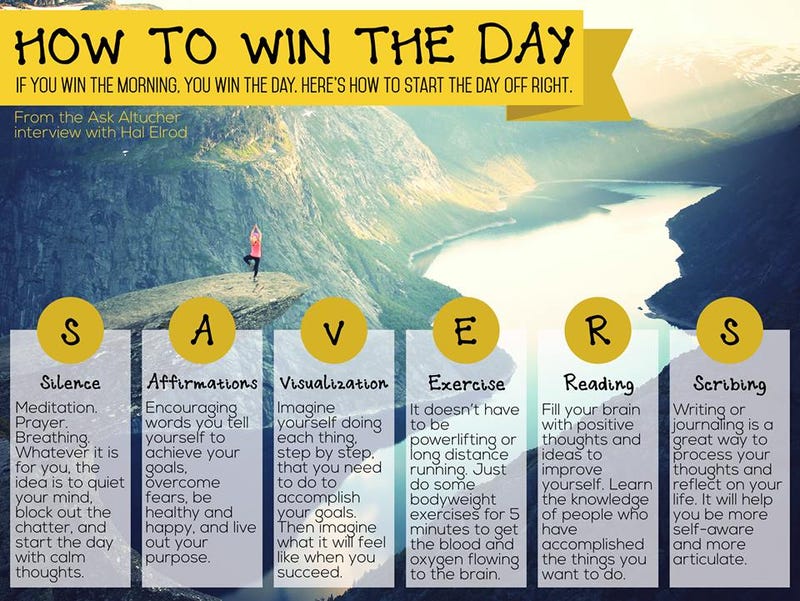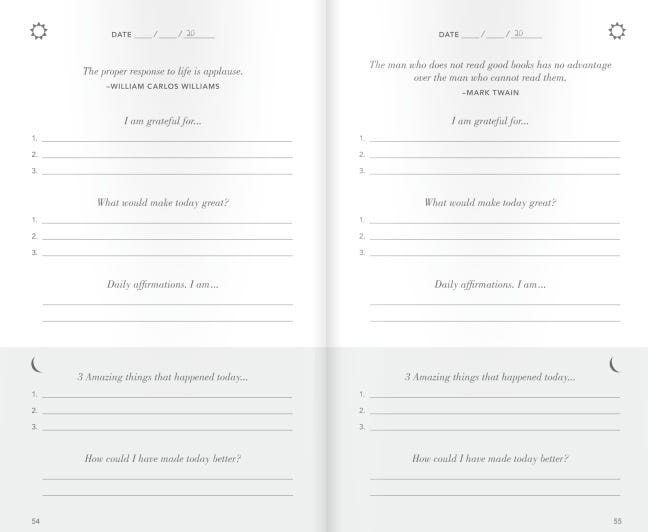

Miracle Morning: Why I Had it All Wrong (& What I've Learned Since)
Ya gotta admit... it sounds a little airy fairy...
Wake up earlier, locking in less sleep each night, to be more productive?
Skepticism, more than outright doubt, was what I found myself grappling with 3 years ago after first listening to Podcast Episode 157: A Simple Morning Ritual to Help You Dominate Ever Area of Your Life with Hal Elrod.
Hal has a compelling story, a body of anecdotal & scientific evidence at his back, and the product he's selling costs only a little bit of faith & execution: wake up earlier and mindfully engage in specific, simple activities to help prime your body for the day.

To be honest I didn't really "get it" at first. I chose instead to add aspects of Hal's Life S.A.V.E.R.S. into my life piecemeal, and only much later adding the part about purposefully waking up earlier to cram it all in.
And the funny thing is, most of the benefits I've experienced following the tenets of S.A.V.E.R.S. are quite different than what I had assumed they'd be going in.
In that spirit, here are 5 things I learned doing Hal Elrod's Miracle Morning for more than a year:
1) Meditation:
Expected benefit: increased happiness through fewer negative thoughts
Actual benefit: increased concentration on present task
Meditation is a sticky subject in the written medium: the benefits of a "quieter" mind are a bit... esoteric. Subliminal, maybe is the better word; hard to explain the benefits of consistent practice to someone who hasn't already put a lot of hours into doing it.
In any case, I had picked up the habit as a means of coping with the anxiety associated with being a millennial in general and having a "High C" personality type specifically. After hours & years of mindfully cycling through a) noticing a distracting thought, b) recognizing the distraction and c) peacefully [and without judgement] returning your focus back to the task at hand
... I've found that momentary lapses in concentration happen all the time: not just when I'm lying quietly alone on the floor of my home office. I'm distracted at work, at home, while commuting, even when relaxing with friends and family. And, as always, it's okay... Notice the distraction, accept it, and return to your more important work.
If you can learn to do that, you will not only be straight up more productive with the hours you have, but experience less guilt/anxiety over unaccomplished tasks that are neither applicable to, nor actionable in, the present moment.
2) Affirmations:
Expected benefit: re-program my thoughts such that I think more positively
Actual benefit: your brain is predisposed to negative thoughts, and it's up to you to maintain a healthy balance.
One of the more compelling arguments made in the book, and to a lesser extent in the podcast episode, was in favor of the practice of affirmations. As Elrod explains: the area of your brain associated with the fight/flight response, the prefrontal cortex, preferentially receives nutrient-rich blood over more sophisticated, later-developing areas of the brain during periods of limited resources or when in crisis. The rationale is evolutionary: the more ancient parts of the brain, the ones more tied to base survival instincts, tend to take over when under stress in the interest of keeping the organism alive long enough to reproduce. Thus, the species as a whole tends to continue existing.
One way I've heard it explained: Imagine you're on the African plains and you see an object out of the corner of your eye; it could be a lion, or it could be a harmless yellow rock. If you think it's a yellow rock and it turns out to be a lion, you're dead. If, however, you think it's a lion and it turns out to be a yellow rock, you'll experience a jolt of panic and anxiety... an uncomfortable sensation to be sure, but one designed by nature to get you out of anything life-threatening. Perhaps over a lifetime you'll see a thousand yellow rocks, experiencing a thousand momentary jolts of pain and anxiety along the way: still "better" than even one unarmed lion encounter, evolutionarily-speaking.
For better or worse, our 21st Century Homo Sapien brains have inherited this predisposition towards panicky, negative thoughts which draw a disproportionate amount of focus to all the yellow rocks which ultimately mean us no harm. Add to that the similarly irrational (in a modern-day sense) fear of public criticism, and hopefully it all starts to paint a picture: painful thoughts come to us naturally, and this effect must be purposefully counter-balanced with words of affirmation to reset the thermostat of your self-image.
I know it's a little weird at first, but think of it this way: groundwater is usually too cold for the bath you want to take. Mix in some hot water from the tap and you're in for a much more pleasant experience.
3) Exercise:
Expected benefit: most people won't exercise later in the night, so just do it and get it over with
Actual benefit: the stress hormone cortisol is out to ruin your mojo, and it peaks in the morning. Exercise it out of you early and you bring your whole self to the job
Another benefit to not appear until a few months after starting the habit: one of the principle reasons for morning exercise comes in the knowledge that the stress hormone cortisol tends to peak in the early morning hours:

(c/o ExperienceLife.com)
Put (overly) simply: cortisol spikes in the morning in part to help wake you up and get your day going. Under normal circumstances this cortisol peak does not come until late morning (around 8 or 9am) but during periods of high and/or chronic stress cortisol levels can become irregular: peaking at higher levels & occurring earlier in the morning than is necessary or healthy, causing you to wake up in a cold sweat at 5am with nothing to fight or run away from.
It would be biochemically incorrect for me to claim that exercise turns cortisol into something less stress-inducing, and unfortunately the mechanisms for how exercise helps manage cortisol-induced stress are more complicated than it's worth it to get into here (& I'm not really qualified to speak on it, anyway). However, anecdotally speaking, you've got all this nervous, negative energy early in the day and you need to put it somewhere.
Counter-act the catabolic (muscle-wasting) effect of waking up with anabolic (muscle-building) activities before the day begins requiring things of you. For Tiffany & I, that is 25 minutes of strength training or a 30 minute dog walk. For many/most it may be less than that to start: 10 minutes, or 5 minutes, or just 1, but here's the reality check: there is a TON of evidence out there on this, and it's worth you trying it.
4) Journaling/Scribing:
Expected benefit: "if nothing else, it'll be something nice to look back on years from now..."
Actual benefit: focused reflection on yesterday's successes & failures give you vital feedback on how well your daily activities contribute to your overall goals
Journaling was one of the last things to be added to my mornings for all the same reasons why I've never really taken social media more seriously: why do it? Why not just live my life without advertising it? Is it not enough to live, I also have to document and critically analyze it?
My paradigm shift came reading The One Thing by Gary Keller & Jay Papasan, particularly when they introduced the 411 tool:

Because the 411 identifies the weekly goals which contribute most to my year-long and career/life goals, it follows that there may be some benefit to seeing how my daily activities track with where I know I need to be. Makes sense so far...
In practice, it is as simple as journaling each morning, identifying 2-4 things that:
1) went well objectively (or, what did I do well, subjectively) yesterday, and
2) what happened yesterday that objectively did not go well (or, what subjectively did I do that I think I could have handled better)
More than enough feedback for your subconscious mind to chew on: are things going according to plan, or not so much?
5) Visualization:
Expected benefit: "it's about visualizing the end result: seeing your goals coming true will motivate you to make it a reality"
Actual benefit: "it's about identifying today's most vital tasks & action steps which lead you towards your goal."
My final step in journaling:
3) what are the 2-3 things I need to make today a success?
If I can focus on and satisfactorily complete the 2 or 3 most important items which contribute the most to my overall goals, the day by definition will be some degree of successful. Identifying these core objectives each day means I'm always operating from a position of strength: I know what today is going to require of me, and I'm totally clear on the long-term benefits of following the plan.
Think that might help?
(an example of a done-for-you journal: the 5 minute journal, which Elrod claims he uses more consistently than his own version)
Final thoughts:
Not exactly what I had expected going in, but in the end I have some level of understanding what some of Elrod's followers are so excited about. I can vouch for the program as being worth every moment of the self-development it took to make it habit, though, admittedly, it was likely easier for me than it may be for you: I was a morning person to begin with...
(And by the way, Hal was also a guest on BP episode 284: The "Miracle" Behind Becoming a Millionaire with Hal Elrod and David Osborn, in which he expands on the first podcast in a few ways; it's also worth a listen.)







Comments